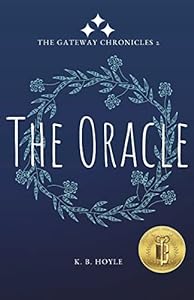 Summary: The last book ended in tragedy. Now Darcy, and the others want to fix their error.
Summary: The last book ended in tragedy. Now Darcy, and the others want to fix their error.
The problem with reviewing a series is that the longer into the series, the harder it is to discuss the book without giving away important plot points from earlier books that are essential to the describing the story for the later books.
I am going to still be vague here, but I may give up on that by the next book. My short version review is that I have very much enjoyed this series so far and I stayed up until 2 AM earlier this week to finish up The White Thread.
KB Hoyle continues to play with young adult fantasy conventions and leave a ton of references to other books for the readers that are probably a bit older and more widely read. The White Thread is ultimately a quest book like most fantasy stories. But in that quest there is a clear reference to the third Narnia book as well as the Odyssey and other quests. As some point I want to ask the author if she is dropping in these references intentionally to lead the reader somewhere or if she is writing the story and some of the reference sneak in initially and she just goes with it. I would guess that these are pretty intentional. But I have read plenty of interviews with authors that have suggested that many of the references that others read into their books were not put there by them. (In response to this review, KB Hoyle and I had a good conversation about references and allusions in writing. I am adding a paragraph at the end of the review because of that conversation.)
At the end of The Oracle, Darcy was forced to pay a price for the answer to her question, that price was significant. She spent the whole year at home trying to figure out how she might solve the problem. But there are two other problems that develop at home. First at the end of the Oracle, the boy at camp that knows about the magical world, but is not with The Six because he appears to be a supporter of the evil ruler disappears. Darcy gains a new level of empathy for him because she observes his father beating him.

 Summary: An orientation to the Enneagram focused on relationships.
Summary: An orientation to the Enneagram focused on relationships. Takeaway: Skip the audio and do this book in print.
Takeaway: Skip the audio and do this book in print. Takeaway: We are actually supposed to be praying the Lord’s Prayer.
Takeaway: We are actually supposed to be praying the Lord’s Prayer.



 Summary: In order to be a Christian within culture, we need to understand what the culture is. Which means we need to be rooted in historic Christianity as a means of disrupting the effects of culture.
Summary: In order to be a Christian within culture, we need to understand what the culture is. Which means we need to be rooted in historic Christianity as a means of disrupting the effects of culture.